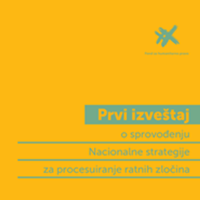
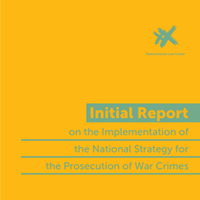 The Humanitarian Law Center (HLC) and the daily newspaper “Danas” invite you to a debate regarding the “Initial Report on the Implementation of the National Strategy for the Prosecution of War Crimes” and a presentation of public opinion research on “Serbian Citizens’ Awareness of the Wars in the ’90s, War Crimes and Trials of War Crimes Indictees”. The debate is scheduled for Monday, December 18, 2017, in the Grand Hall of the Media Center Belgrade (Terazije 3, II floor) starting at 11:00 a.m.
The Humanitarian Law Center (HLC) and the daily newspaper “Danas” invite you to a debate regarding the “Initial Report on the Implementation of the National Strategy for the Prosecution of War Crimes” and a presentation of public opinion research on “Serbian Citizens’ Awareness of the Wars in the ’90s, War Crimes and Trials of War Crimes Indictees”. The debate is scheduled for Monday, December 18, 2017, in the Grand Hall of the Media Center Belgrade (Terazije 3, II floor) starting at 11:00 a.m.
In February 2016, the Government of the Republic of Serbia adopted the first National Strategy for the Prosecution of War Crimes (Strategy) for the period 2016-2020. The HLC has been monitoring the implementation of the Strategy from the beginning, with the aim of offering independent research findings and conclusions on its implementation. The findings of the HLC are at the same time the only insight into the implementation of the Strategy, since the establishment of the official body for its monitoring has been delayed for 18 months, so that the public is still deprived of information on the implementation of the measures and activities envisaged.
The HLC’s Report on the Implementation of the National Strategy for the Prosecution of War Crimes provides an overview of the current situation in the eight fields covered by the Strategy, points out key weaknesses and identifies recommendations for improving the situation in those fields.
For the first time since 2011, the Research on Public Opinion represents citizens’ views on war crimes trials before domestic courts and the Hague Tribunal, as well as on the opening of the archives, regional co-operation of the judiciary, political rehabilitation of war crimes perpetrators, compensation for victims, establishing memorials, and reform of the educational programme, and speaks about the perceptions of guilt and responsibility for the crimes committed and the general public’s level of awareness with regard to the wars and crimes of the 1990s.
Representatives of the judiciary, competent ministries and government bodies, independent institutions, non-governmental organizations, the media, international organizations and embassies, and Members of the National Assembly of the Republic of Serbia, are invited to the debate.
Speakers:
Višnja Šijačić, Humanitarian Law Center
Relja Radosavljević, Humanitarian Law Center
Jelena Diković, Daily newspaper Danas
Aleksandar Roknić, Daily newspaper Danas
Simultaneous translation into English is provided.

 The Humanitarian Law Center (HLC) has been monitoring and providing support to war crimes trials since the first war crimes proceedings conducted in Serbia in 2002. The HLC is the only organization that has been continuously monitoring and analyzing war crimes trials in Serbia and informing the public at home and abroad about them. It has been representing victims in war crimes cases through an attorney, filing criminal complaints with the Office of the War Crimes Prosecutors (OWCP) against suspected perpetrators, and sharing its documentation on war crimes.
The Humanitarian Law Center (HLC) has been monitoring and providing support to war crimes trials since the first war crimes proceedings conducted in Serbia in 2002. The HLC is the only organization that has been continuously monitoring and analyzing war crimes trials in Serbia and informing the public at home and abroad about them. It has been representing victims in war crimes cases through an attorney, filing criminal complaints with the Office of the War Crimes Prosecutors (OWCP) against suspected perpetrators, and sharing its documentation on war crimes. 





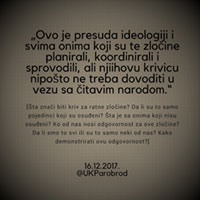
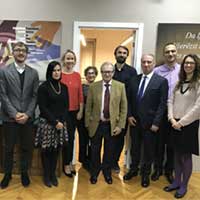
 The President of the International Criminal Tribunal for the former Yugoslavia (ICTY), Judge Carmel Agius, visited the Humanitarian Law Center (HLC) on 31st October 2017. On this occasion, the judge spoke with representatives of the HLC about the efficiency of the prosecution of war crimes in Serbia, the cooperation of Serbia and the countries in the region with the ICTY, as well as with each other, and the importance of presenting the court-established facts to the post-conflict societies of the former Yugoslavia.
The President of the International Criminal Tribunal for the former Yugoslavia (ICTY), Judge Carmel Agius, visited the Humanitarian Law Center (HLC) on 31st October 2017. On this occasion, the judge spoke with representatives of the HLC about the efficiency of the prosecution of war crimes in Serbia, the cooperation of Serbia and the countries in the region with the ICTY, as well as with each other, and the importance of presenting the court-established facts to the post-conflict societies of the former Yugoslavia. 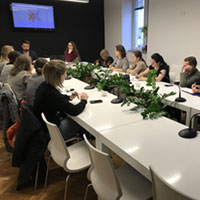
 The Humanitarian Law Center (HLC) was visited yesterday by activists of “Justice for Peace in Donbass”, from Ukraine. This Coalition gathers NGOs and initiatives from Ukraine with the aim of documenting human rights violations in those regions that have been affected by the armed conflict since 2014. The aim of the Coalition is to collect all relevant human rights violations that will later support court proceedings against perpetrators of crimes and thus provide one of the basic preconditions for the return of peace and reconciliation in East Ukraine.
The Humanitarian Law Center (HLC) was visited yesterday by activists of “Justice for Peace in Donbass”, from Ukraine. This Coalition gathers NGOs and initiatives from Ukraine with the aim of documenting human rights violations in those regions that have been affected by the armed conflict since 2014. The aim of the Coalition is to collect all relevant human rights violations that will later support court proceedings against perpetrators of crimes and thus provide one of the basic preconditions for the return of peace and reconciliation in East Ukraine.

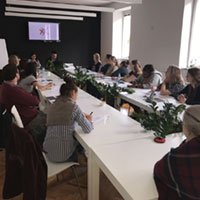









 On Tuesday, August 22nd, 2017, the Humanitarian Law Center (HLC) presented the report
On Tuesday, August 22nd, 2017, the Humanitarian Law Center (HLC) presented the report 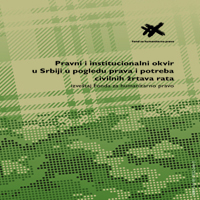
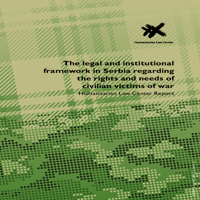 rmed conflicts in the territories of the former Yugoslavia lasted from 1991 to 2001. The wars in Croatia (1991-1995), Bosnia and Herzegovina (1992-1995) and Kosovo (1998-1999) resulted in the mass murders of civilians, ethnic cleansing and persecution of hundreds of thousands of people, but also a large number of grave crimes unseen in Europe since World War II. Serbia had an active and involved role in these conflicts. In the context of the armed conflicts, the authorities in Serbia during this entire period were responsible for serious violations of the fundamental rights of its own citizens from the ranks of national minorities, as well as of some members of the majority Serbian population. In Serbia today there are a significant number of citizens who came to Serbia as refugees owing to the wars in other countries of the former Yugoslavia, and most of them have remained in Serbia permanently. Among them are a fair number who survived crimes, whose physical and psychological consequences they suffer to this day, as well as many of those who lost one or more family members in the war.
rmed conflicts in the territories of the former Yugoslavia lasted from 1991 to 2001. The wars in Croatia (1991-1995), Bosnia and Herzegovina (1992-1995) and Kosovo (1998-1999) resulted in the mass murders of civilians, ethnic cleansing and persecution of hundreds of thousands of people, but also a large number of grave crimes unseen in Europe since World War II. Serbia had an active and involved role in these conflicts. In the context of the armed conflicts, the authorities in Serbia during this entire period were responsible for serious violations of the fundamental rights of its own citizens from the ranks of national minorities, as well as of some members of the majority Serbian population. In Serbia today there are a significant number of citizens who came to Serbia as refugees owing to the wars in other countries of the former Yugoslavia, and most of them have remained in Serbia permanently. Among them are a fair number who survived crimes, whose physical and psychological consequences they suffer to this day, as well as many of those who lost one or more family members in the war.